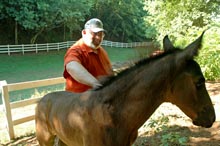News Release
For Immediate Release — June 27, 2008
Lifetime achievement award bestowed upon UT veterinary entomologist

Dr. Carl J. Jones
For his research contributions that benefit livestock and humans, alike, University of Tennessee Veterinary Entomologist Dr. Carl J. Jones has received a Lifetime Achievement Award from the international Livestock Insect Workers Conference.
In recognition of a career of outstanding contributions to animal health and productivity through veterinary (livestock) entomology, Bayer Animal Health and the international Livestock Insect Workers Conference have bestowed a Lifetime Achievement Award on Dr. Carl J. Jones, professor and head of the University of Tennessees Department of Entomology and Plant Pathology.
The award was presented at the 52nd annual Livestock Insect Workers' Conference (LIWC) in Kansas City, Missouri. The LIWC is a non-profit organization that provides opportunities for veterinary entomologists and allied professionals in the United States and Canada to meet on a regular basis. Participants share knowledge and ideas and develop and renew collaborative efforts. LIWC participants primarily address the management of arthropod pests of livestock and poultry, and, to a lesser extent, those affecting wildlife and companion animals
Four previous winners of the Lifetime Achievement Award were among those who nominated Jones for the honor, and his selection was unanimous among a committee of six members. It is rare that the award goes to a department head. Jones, however, has continued to conduct research and collaborate with other scientists and graduate students while distinguishing himself as an able administrator.
The conference credited Jones for his contributions to medical and veterinary entomology at the national, regional, university and local levels. Some of his career highlights include:
- Analyzing the impact of mosquitoes on sheep in Wyoming and making the first American collections of mosquitoes specifically attracted to sheep.
- Researching the movement of stable flies on weather fronts in Florida and in the mid-west to improve methods of detecting larval development sites for better insect control. Stable flies, Jones says, “will take blood from tourists and dogs as well as cattle, and their bites are painful.” The flies have spread from being just pests around stables to being pests in pastures and beaches. They are also known to carry E coli 0157H7, one of the most deadly enteric diseases for humans.
- Associating house flies with the distribution of pathogens in livestock rearing facilities.
- Determining the seasonality of beneficial parasitoids of muscoid flies in dairy and feed lots to improve bio-control efforts.
- Analyzing the movement of Lyme disease and the tick that serves as its vector into areas not previously known to have problems with the disease. This work has aided prediction models derived from habitat requirements of the ticks.
- Studying the impact of drought on ticks. “It’s beneficial,” Jones says. “There are fewer ticks during drought, but they bounce back the next spring, just as they seem to have done this year in Tennessee.”
- and analyzing, with UT Entomology Professor Reid Gerhardt, factors that result in the development of LaCrosse encephalitis. Regarding this research and other activity, Jones says, “It’s done collaboratively. My time constraints mean that I’m an ideas man and sometimes a techniques guy, but most often it’s other scientists and the graduate students who now do the work.”
He has shared findings from these and other studies with the research community by authoring or co-authoring 74 refereed publications, along with 52 abstracts and conference proceedings, and more than 66 invited presentations and 43 other scientific presentations. All of these, according to UT professor Gene Burgess, have been “outstanding contributions and benefits to the animal health industry.”
“The publications are always Jones and somebody or somebody and Jones,” Jones says. “The people I’ve gotten to work with have cross-pollinated my work and lead it in unexpected directions. I’ve had the opportunity to work with, and benefit from, people whose training is completely different than mine — veterinarians, animal scientists, physicians, epidemiologists, and immunologists. It’s been wonderful.”
Jones was also instrumental in developing and expanding the University of Tennessee Extension’s plant pest and insect distance diagnostics program, and he has been a leader in his unit’s outstanding contributions to hemlock woolly adelgid control in the Great Smoky Mountains, Cherokee National Park, and eastern forests.
“I believe Carl was long overlooked for this award as he had done a terrific job in promoting livestock entomology among our societies and among the USDA Agricultural Research Service,” says Conference member Dr. Fred Knapp, emeritus professor of Entomology and assistant director of Kentucky Agriculture Experiment Station.
“Carl has an outstanding professional service record in entomology, particularly in veterinary (livestock) entomology. He has and will continue to represent veterinary entomology with absolute distinction.
In the 27 years the Lifetime Achievement Award has been presented, it has gone only three times to scientists with University of Tennessee ties, and those have all been recently. In 2006 it was presented to UT Entomologist Dr. Reid Gerhardt and in 2005 one of Gerhardt’s former master’s students, Dr. Brad Mullens, received the honor.
###
Contact: Dr. Carl J. Jones, (865) 974-7135
Margot L. Emery, (865) 974-7141


